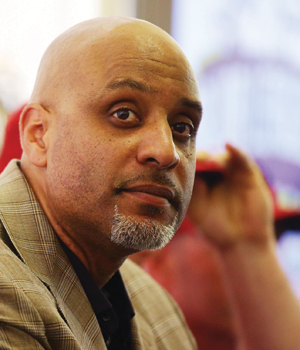Since 1994, the Major League Baseball Players Association and MLB have enjoyed labor peace. In 1994, a strike by the players abruptly ended the MLB season that August which marked the first time since 1904 that the World Series wasn’t played. Since then the MLBPA and MLB have enjoyed soaring salaries for players while the owners have basked in heavy revenue. But all is not well in the world of baseball as there is a divide that could lead to the first work stoppage in over two decades.

Tony Clark
Tony Clark is the current executive director of the Major League Baseball Players Association as he assumed the role in December 2013. Clark also spent 15 years as an MLB first baseman which was highlighted by an All-Star Game appearance in 2001. And Clark has made the smooth transition from the field to the front office. But now Clark must deal with an issue that tends to divide parties and that is money.
Whereas Major League Baseball is in the midst of a boom from revenue which includes game tickets, television contracts, and the sale of merchandise such as hats and jerseys, there is a growing divide in the finances. Recently there has been a growing trend where veteran players who become unrestricted free agents are being pushed out of MLB; not because of the inability to play, but more due to the salary that they command. There is also an issue with service time as teams have been practicing holding promising rookies down in the minor leagues in order to extend the time before they can become unrestricted free agents. Clark and the players are also upset that they are only receiving 43 percent of MLB’s revenue while the remaining 57 percent is dropped into the laps of the owners. And once you add all of this up, Clark and MLB commissioner Rob Manfred will have to engage in some lengthy talks between now and this December when the current collective bargaining agreement expires in order to avoid a repeat of 1994 when the game that is referred to by many as “America’s pastime” took a huge hit to its popularity.
Major League Baseball doesn’t have a salary cap like other sports, but they do have the luxury tax. The luxury tax was introduced in 1996 as a way to invoke a competitive balance which would allow for the smaller-market clubs to compete with the bigger-market teams. MLB would set a payroll number each year and if a team went over that threshold, they would have to pay money to MLB which distributes it to the smaller-market teams. Organizations such as the New York Yankees and Los Angeles Dodgers have paid no mind to MLB’s luxury tax as they are constantly over it and in the past few seasons, each team’s annual payroll has been north of $200 million. And then there are the team’s that will count their pennies that don’t want to exceed the luxury tax which puts rookies and veterans alike in a bind as teams don’t want to get tied down to a veteran player who’ll they’ll have to compensate while also bleeding the service time before a player can become an unrestricted free agent.
Under the current Major League Baseball terms, a players must have six years of service before hitting free agency which also involves up to three years of arbitration. Some teams try to give a player an extension based on salaries at his respective position before or during his three arbitration years, while others roll the dice on a player becoming a free agent. There are also situations when a team knows that they will be unable to sign a player to a long-term deal which results in a trade. And then there is the process of arbitration which could altogether damage the relationship between a player and a team. In each round of arbitration, a player’s agent along with representatives from his current team will state their respective cases in front of an independent arbitrator as to what they feel that the player deserves in salary for the next year. For the most part things will end very tidy, but there are those instances where players will take it personal when a team displays their reasoning for not wanting to compensate a player with the salary that he desires.
Players are also seeking the become free agents earlier due to the fact that under current service time rules, most players don’t become unrestricted free agents until the age of 30 which hinders their earning power on the open market as the majority of their prime athletic years are in the rear-view mirror. And the bad elements of the current collective bargaining agreement are on full display right now.

Gerrit Cole
Pittsburgh Pirates starting pitcher Gerrit Cole was the first overall pick of the 2011 Major League Baseball Draft. When Cole signed with the Pirates, he received an $8 million signing bonus which was the largest in MLB history at the time. In three years with the Pirates, Cole is 40-20 with an earned run average of 3.07. Last year Cole won 19 games and finished fourth in the National League Cy Young Award balloting. In 2015, Cole only earned $531k and this season he will receive $541k. Pirates general manager Neal Huntington had every opportunity to give Cole a respectable salary increase, but instead opted to go with the notion that these are the current rules. Cole has expressed his frustration publicly about his 2016 compensation and with him set for his first round of arbitration next year, the Pirates have put themselves in a bind. Unless the Pirates would now be willing to overpay Cole, they will have to look at trading him in the coming years because they will undoubtedly lose him when he hits free agency in 2020.
Before second baseman Daniel Murphy became a free agent this off-season, he was offered one-year qualifying offer from the New York Mets for $15.8 million. Murphy balked at the deal which gave him the opening to become a unrestricted free agent while the move gave the Mets an opportunity to procure an additional first-round pick in this June’s Major League Baseball Draft. Murphy gambled on his worth as a 30-year old contact hitter with questions surrounding his fielding ability. Murphy’s gamble didn’t pay off and he was only offered a three-year deal from the Washington Nationals for $37.5 million which he accepted.

Ian Desmond
Murphy’s arrival in Washington meant the end of the tenure of shortstop Ian Desmond there. A few years ago the Nationals offered Desmond a seven-year extension that was worth $107 million. But Desmond passed on the offer and elected to pursue an even bigger payday in free agent. And all Desmond did this off-season was wait around for the phone to ring which didn’t happen until this week when the Texas Rangers offered him a one-year deal that is worth $8 million. But to make matters worse, Desmond won’t be playing shortstop for the Rangers as the team has already informed him that he will be heading to left field.
This isn’t the first off-season that veteran players have been priced out as after the 2009 Major League Baseball season, outfielder Jermaine Dye was looking for one last solid payday which he didn’t receive. At the age of 35 in 2009, Dye batted .250 with an on-base percentage of .340 while hitting 27 home runs and driving in 81 runs for the Chicago White Sox. That off-season, Dye never received a contract offer and by 2011, he retired.
During Bud Selig’s tenure as Major League Baseball commissioner, he oversaw labor peace while also cleaning up the game for the ills of performance-enhancing drug use. And now Manfred’s job is to keep this going, but he’ll have to deal with some financial issues that Selig didn’t have to.
Whether the owners like it or not, they are going to have to give the players a larger piece of the revenue pie. And if the owners don’t want to do that, they are a going to have to adjust the free agency rules to keep the players happy, or if not adjusting free agency and the players share of the revenue.
I understand that teams don’t want to get stuck with long, bloated contracts such as the Philadelphia Phillies are currently facing with first baseman Ryan Howard, but you cannot blame a player for signing his name on the bottom line when a team’s front office agrees to fork over the money. Some teams are also duped by super agents such as Scott Boras who always seem to invoke a “mystery team” when he is attempting to gain leverage in order for his client to get the lofty payday that he is seeking. Teams typically give in on deals that are back loaded for players that are over the hill, and for some strange reason, they never learn.
It’s not out of the realm of possibilities to think that the Major League Baseball owners would opt for contracts that are not guaranteed in the fashion that they are in the National Football League. But the MLBPA is a stronger union than the NFLPA and I would not see Clark or the players ever agreeing to such a notion.

Rob Manfred
But I can see a work stoppage on the horizon due to the fact that the current system that is in place is flawed. It might not be a work stoppage that will carry over to the 2017 Major League Baseball season, but it could be something that will hinder free agency next winter which would make it a mad scramble for teams to procure talent while putting a scare into all parties involved to have a deal done in time for spring training. Life is about making adjustments, and the time is now for Manfred and Clark to adjust to each other’s style while also further cementing their respective Major League Baseball legacies while maintaining labor peace.


Leave A Comment